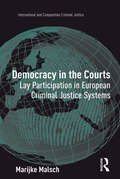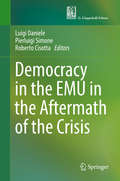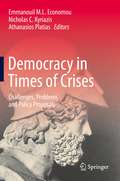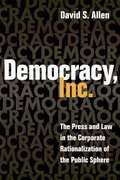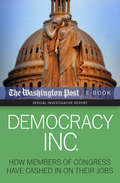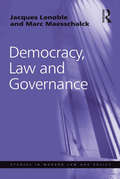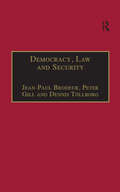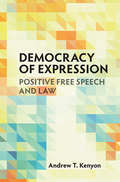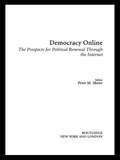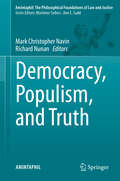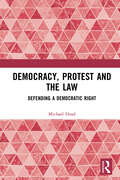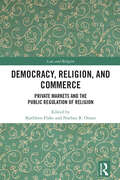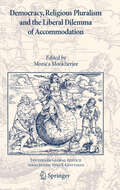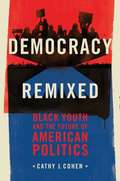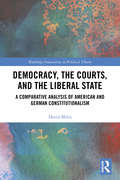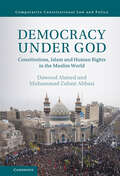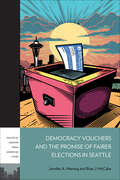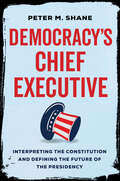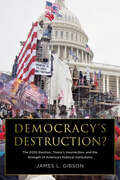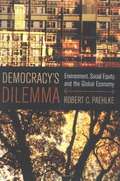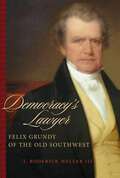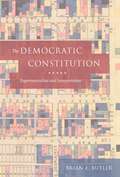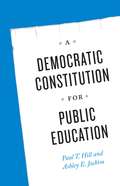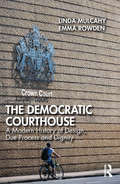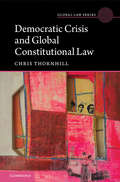- Table View
- List View
Democracy in the Courts: Lay Participation in European Criminal Justice Systems (Hakluyt Society, First Ser.)
by Marijke MalschDemocracy in the Courts examines lay participation in the administration of justice and how it reflects certain democratic principles. An international comparative perspective is taken for exploring how lay people are involved in the trial of criminal cases in European countries and how this impacts on their perspectives of the national legal systems. Comparisons between countries are made regarding how and to what extent lay participation takes place and the relation between lay participation and the legal system's legitimacy is analyzed. Presenting the results of interviews with both professional judges and lay participants in a number of European countries regarding their views on the involvement of lay people in the legal system, this book explores the ways in which judges and lay people interact while trying cases, examining the characteristics of both professional and lay judging of cases. Providing an important analysis of practice, this book will be of interest to academics, legal scholars and practitioners alike.
Democracy in the EMU in the Aftermath of the Crisis
by Luigi Daniele Pierluigi Simone Roberto CisottaThe book covers some of the major issues concerning the problematic relationship between respect for democratic principles and the new European Economic Governance. Innovative approaches are highlighted throughout the book: new frameworks and arrangements are proposed on the basis of efficiency analyses, as well as their institutional and legal suitability. Though the perspective adopted is essentially a legal one, the economic and policy background are also given due consideration. The papers presented here offer a balanced mix of empirical (including comparative) and theoretical analysis; several also combine the two approaches, carrying out empirical analyses, then setting the results against theoretical options. Given the relative dearth of literature on democratic principles and the EMU, let alone a comprehensive enquiry, the book marks a valuable new contribution.
Democracy in Times of Crises: Challenges, Problems and Policy Proposals
by Emmanouil M.L. Economou Nicholas C. Kyriazis Athanasios PlatiasInspired by the democratic origins of the Greek naval victory at Salamis, the book discusses the current pressing issues of democracy worldwide. In 12 carefully selected chapters, well-renowned scholars from around the globe discuss topics such as Brexit, Euroscepticism, or the rise of populism. The authors further analyze various aspects of democracy, as well as various types of democratic regimes, such as mixed government, direct democracy, and cases of quasi democracies. While doing so, they relate this discussion to the pivotal question of how the quality of democracy today can be improved, seeking answers and solutions to current pending problems at the global level. This book is the second out of two edited volumes as a sequel of an international academic conference titled Salamis and Democracy: 2500 Years After that took place between October 3rd and October 5th, 2020, on the occasion of the 2500th anniversary of the great historical event of the Battle of Salamis, which saved Greek culture and the newly founded democratic regimes throughout the Hellenic world during the Classical period (508-323 BCE). The book is a must-read for scholars and students of political science, economics, and law, as well as policy-makers interested in a better understanding of democracy, governance, populism, social choice, and constitutional law.
Democracy, Inc.: The Press and Law in the Corporate Rationalization of the Public Sphere
by David S. AllenIn Democracy, Inc., David S. Allen exposes the vested interests behind the U.S. slide toward conflating corporate values with public and democratic values. He argues that rather than being institutional protectors of democratic principles, the press and law perversely contribute to the destruction of public discourse in the United States today. Allen utilizes historical, philosophical, sociological, and legal sources to trace America's gradual embrace of corporate values. He argues that such values, including winning, efficiency, and profitability actually limit democratic involvement by devaluing discursive principles, creating an informed yet inactive public. Through an examination of professionalization in both the press and the law, corporate free speech rights, and free speech as property, Democracy, Inc. demonstrates that today's democracy is more about trying to control and manage citizens than giving them the freedom to participate. Allen not only calls on institutions to reform the way they understand and promote citizenship but also asks citizens to adopt a new ethic of public discourse that values understanding rather than winning.
Democracy Inc.: How Members of Congress Have Cashed In On Their Jobs (Special Investigative Report)
by The Washington Post David S. Fallis Scott Higham Dan Keating Kimberly KindyAn investigation into how legislators have taken advantage of their positions—and of weak financial disclosure laws—to make millions. After a historic financial crisis led Congress to unprecedented economic intervention, the Pulitzer Prize-winning Washington Post began an investigation that pierced the secrecy of the deeply flawed financial disclosure system that governs the 535 men and women who draft the nation&’s laws. Members of Congress directed millions of dollars to infrastructure projects near their residences and businesses, in some cases paving roads in front of their houses. They made major trades in the stocks of companies pressing them for legislation. They wrote laws favoring industries in which they were invested. They sponsored bills on which their own family members were paid to lobby. All of it is legal under the rules Congress has written for itself. Democracy Inc. shows the consequences of this system.
Democracy, Law and Governance (Studies In Modern Law And Policy Ser.)
by Marc Maesschalck Jacques LenobleDemocracy, Law and Governance details the transformation of the modes of governance of contemporary developed democracies and aims to define the conditions required for promoting public interest in their public policy. Firstly, the volume illustrates why a sound theoretical approach to the concept of law results in opening up the theory of law to the debate on governance in the social sciences. Secondly, it reconstructs the underpinnings of recent debate on governance, focusing on the pragmatist turn that has marked efforts to overcome the inadequacies of both the economic and the deliberative approaches. In fulfilling this second goal, it examines the advances yielded by the pragmatist turn as well as its limitations, and concludes by proposing a theoretical approach for dealing with them. This illuminating book applies recent research in both theory of law and theory of governance to deepen the analytic impact of the recent pragmatist revival.
Democracy, Law and Security: Internal Security Services in Contemporary Europe
by Peter GillIn the past decade there have been significant changes in the operations of security and intelligence agencies throughout Europe. Those in the former Eastern Europe have undergone the most obvious changes in their targets and the legal context within which they operate, but these changes have affected all the agencies to some extent. It is these changes that will provide the context of structures and processes through which the agencies will respond to the September 11, 2001 attack on New York and Washington. This edited collection of papers by an international group of experts in the study of security and intelligence examines recent and current developments in the light of the rule of law and democracy and specifically addresses a number of common themes. Firstly, security and intelligence agencies are placed within the broader context of their parent state, including whether their powers originate in legislation or executive decree and the form of oversight. Secondly, the types of agency - civilian, military, foreign and domestic - are considered in the context of their historical development, including the transition from authoritarian to liberal state forms. Thirdly, the changes in their mandate and targets are discussed, in particular, towards 'terrorism', 'transnational organized crime' and economic intelligence. Finally, each author considers the enduring issue of how the impact of security and intelligence agencies is to be assessed in terms both of security and human rights. This book represents the first systematic attempt to present a collection of contemporary studies on the shifts in this crucial aspect of the operation of all states, and to do so within a framework of common themes. Although significant differences remain in the operation of security intelligence, all the authors highlight the common dilemmas that accompany the attempt to provide security but to do so democratically.
Democracy of Expression: Positive Free Speech and Law
by Andrew T. KenyonFree speech has positive dimensions of enablement and negative dimensions of non-restraint, both of which require protection for democracy to have substantial communicative legitimacy. In Democracy of Expression, Andrew Kenyon explores this need for sustained plural public speech linked with positive communicative freedom. Drawing on sources from media studies, human rights, political theory, free speech theory and case law, Kenyon shows how positive dimensions of free speech could be imagined and pursued. While recognising that democratic governments face challenges of public communication and free speech that cannot be easily solved, Kenyon argues that understanding the nature of these challenges (including the value of positive free speech) at least makes possible a democracy of expression in which society has a voice, formulates judgments, and makes effective claims of government. In this groundbreaking work, Kenyon not only reframes how we conceptualize free speech, but also provides a roadmap for reform.
Democracy Online: The Prospects for Political Renewal Through the Internet
by Peter M. ShaneTaking a multidisciplinary approach that they identify as a "cyber-realist research agenda," the contributors to this volume examine the prospects for electronic democracy in terms of its form and practice--while avoiding the pitfall of treating the benefits of electronic democracy as being self-evident. The debates question what electronic democracy needs to accomplish in order to revitalize democracy and what the current state of electronic democracy can teach us about the challenges and opportunities for implementing democratic technology initiatives.
Democracy, Populism, and Truth (AMINTAPHIL: The Philosophical Foundations of Law and Justice #9)
by Mark Christopher Navin Richard NunanThis book tackles questions related to democracy, populism and truth, with results that are sure to inform pressing academic and popular debates. It is common to describe many of today’s most energizing politicians and political movements as populist. Some are progressive advocates of greater economic democracy or individual rights, while others are recognizably authoritarian and anti-democratic, even while claiming to defend democracy. What all populist leaders share in common is a rhetorical approach: their ability to articulate, or at least profess to channel, the wishes of ‘the people’, a group that populist leaders claim a unique ability to understand and govern, especially with regard to their dissatisfaction with ruling elites. They decry corruption (although not necessarily with any sincerity), and they sometimes identify more mainstream politicians and bureaucrats as ‘enemies of the people.’ The rise of populist politics raises pressing questions about the nature of populism, but also about relationships between populism and democratic institutions. For example, is populism ever a democratic tendency, or does its invocation of a monolithic demos (‘the people’) signify a fundamentally anti-democratic worldview? Populist political rhetoric also raises concerns about the relationship between truth, democracy, and journalistic integrity. While the history of anti-democratic advocacy (famously illustrated by Plato) has often highlighted the tendency of a democratic style of politics to prioritize popularity over truth, the development of social media—and evolving norms of journalistic communication and public political discourse—raise these misgivings in new forms.
Democracy, Protest and the Law: Defending a Democratic Right
by Michael HeadIn a new era of rising protests, social unrest and political discontent globally, especially over climate change, war dangers, austerity measures and social inequality, the right to protest is a critical democratic right. Yet it is increasingly controversial and subject to government reaction. This book poses a crucial question: how to defend and extend democracy? It examines the critical historical, social, political, ethical and legal issues raised by the basic democratic right to protest and the legislative and executive measures being taken by governments to restrict it. These measures are examined with a focus on three countries with an English legal heritage: the United States, Britain and Australia. These states are frequently held up as models of liberal democracies, respecting core legal and democratic rights. However, an examination shows that they have adopted far-reaching anti-protest laws and other provisions that threaten protest rights and genuine democracy itself. This book will be of interest to all members of society, as well as students, academics and policy-makers in the fields of civil liberties and human rights, constitutional law, criminal justice, national security and environmental studies.
Democracy, Religion, and Commerce: Private Markets and the Public Regulation of Religion (Law and Religion)
by Kathleen Flake Nathan B. OmanThis collection considers the relationship between religion, state, and market. In so doing, it also illustrates that the market is a powerful site for the cultural work of secularizing religious conflict. Though expressed as a simile, with religious freedom functioning like market freedom, “free market religion” has achieved the status of general knowledge about the nature of religion as either good or bad. It legislates good religion as that which operates according to free market principles: it is private, with no formal relationship to government; and personal: a matter of belief and conscience. As naturalized elements of historically contingent and discursively maintained beliefs about religion, these criteria have ethical and regulatory force. Thus, in culture and law, the effect of the metaphor has become instrumental, not merely descriptive. This volume seeks to productively complicate and invite further analysis of this easy conflation of democracy, religion, and the market. It invites scholars from a variety of disciplines to consider more intentionally the extent to which markets are implicated and illuminate the place of religion in public life. The book will be a valuable resource for researchers and academics working in the areas of law and religion, ethics, and economics.
Democracy, Religious Pluralism and the Liberal Dilemma of Accommodation
by Monica MookherjeeHow should liberal democratic governments respond to citizens as religious believers whose values, norms and practices might lie outside the cultural mainstream? Some of the most challenging political questions arising today focus on the adequacy of a policy of 'live and let live' liberal toleration in contexts where disputes about the metaphysical truth of conflicting world-views abound. Does liberal toleration fail to give all citizens their due? Do citizens of faith deserve a more robust form of accommodation from the state in the form of 'recognition'. This issue is far from settled. Controversies over the terms of religious accommodation continue to dominate political agendas around the world. This is the first edited collection to provide a sustained examination of the politics of toleration and recognition in an age of religious pluralism. The aftermath of the events of September 11th have dramatised the urgency of this debate. It has also surfaced, nationally and globally, in disputes about terrorism, security and gender and human rights questions in relation to minority communities. This volume brings together a group of new and established scholars from the fields of law and philosophy, who all present fresh and challenging perspectives on an urgent debate. It will be indispensable reading for advanced researchers in political and legal philosophy, religious and cultural studies and related disciplines.
Democracy Remixed
by Cathy J. CohenIn Democracy Remixed, award-winning scholar Cathy J. Cohen offers an authoritative and empirically powerful analysis of the state of black youth in America today. Utilizing the results from the Black Youth Project, a groundbreaking nationwide survey, Cohen focuses on what young Black Americans actually experience and think--and underscores the political repercussions. Featuring stories from cities across the country, she reveals that black youth want, in large part, what most Americans want--a good job, a fulfilling life, safety, respect, and equality. But while this generation has much in common with the rest of America, they also believe that equality does not yet exist, at least not in their lives. Many believe that they are treated as second-class citizens. Moreover, for many the future seems bleak when they look at their neighborhoods, their schools, and even their own lives and choices. Through their words, these young people provide a complex and balanced picture of the intersection of opportunity and discrimination in their lives. Democracy Remixed provides the insight we need to transform the future of young Black Americans and American democracy.
Democracy, the Courts, and the Liberal State: A Comparative Analysis of American and German Constitutionalism (Routledge Innovations in Political Theory)
by David MilesReformulating a problem of both constitutionalism and liberalism discussed in the works of Ernst-Wolfgang Böckenförde, Hannah Arendt, and Alexis de Tocqueville, the book examines one generally overlooked manifestation of constitutionalism: the role of the courts in shaping democratic politics and the inter-relationship between citizens and state. Drawing on constitutional history, law, and political theory, David Miles argues that constitutionalism cannot be seen merely as an institutional mechanism to limit government, as it also has a crucial civic dimension upon which the liberal state depends. Utilising the works of Böckenförde, Arendt, and Tocqueville, constitutionalism is conceived in the book as part of a broader system of communal norms which sustains representative democracy and liberalism. Through an analysis of judicial interventions in the electoral processes of the United States and Germany, Miles explores the role of civil society actors in transforming constitutionalism through legal challenges to oligarchical or exclusionary practices. He assesses how, in adjudicating these cases, the US Supreme Court and the German Constitutional Court have mediated the tension between threats to stability and the imperative of democratic renewal. Democracy, the Courts, and the Liberal State will be of interest to scholars, students, and practitioners interested in comparative politics, political theory, and constitutional law and history.
Democracy under God: Constitutions, Islam and Human Rights in the Muslim World (Comparative Constitutional Law and Policy)
by Dawood Ahmed Muhammad Zubair AbbasiThe place of Islam in constitutions invites fierce debate from scholars and politicians alike. Many of these debates assume an inherent conflict between constitutional Islam and 'secular' values of liberal democracy and human rights. Using case studies from several Muslim-majority states, this book surveys the history and role of Islam in constitutions. Tracing the origins of constitutional Islam, Dawood Ahmed and Muhammad Zubair Abbasi argue that colonial history and political bargaining were pivotal factors in determining whether a country adopted Islam, and not secularism, in its constitution. Contrary to the common contention that the constitutional incorporation of Islam is generally antithetical to human rights, Ahmed and Abbasi show not only that Islam has been popularly demanded and introduced into constitutions during periods of 'democratization' and 'modernization' but also that constitutional Islamization has frequently been accompanied by an expansion in constitutional human rights.
Democracy Vouchers and the Promise of Fairer Elections in Seattle (PLAC: Political Lessons from American Cities)
by Brian J. McCabe Jennifer A. HeerwigIn 2017, Seattle inaugurated a new way for citizens to be involved in democracy: they introduced publicly financed vouchers for voters to donate to local candidates. The innovative plan is designed to level the playing field in campaign financing. Through the vouchers, residents allocate dollars to candidates of their choice in local elections, putting political money directly in the hands of voters. The intent is to increase political participation and ameliorate the long-standing representational inequalities of private donations. Democracy Vouchers and the Promise of Fairer Elections in Seattle critically evaluates the success and impact of this program. Jennifer Heerwig and Brian J. McCabe emphasize how local elections now attract a much wider and more diverse field of both donors and candidates. They also consider external threats to the program, from litigation about the constitutionality of a voucher program to the rise of independent expenditures. Offering important lessons on how other cities can adopt a similar program, this compelling case study also highlights the obstacles that will likely arise in its implementation.
Democracy’s Chief Executive: Interpreting the Constitution and Defining the Future of the Presidency
by Peter M ShaneLegal scholar Peter M. Shane confronts U.S. presidential entitlement and offers a more reasonable way of conceptualizing our constitutional presidency in the twenty-first century. In the eyes of modern-day presidentialists, the United States Constitution’s vesting of "executive power" means today what it meant in 1787. For them, what it meant in 1787 was the creation of a largely unilateral presidency, and in their view, a unilateral presidency still best serves our national interest. Democracy’s Chief Executive challenges each of these premises, while showing how their influence on constitutional interpretation for more than forty years has set the stage for a presidency ripe for authoritarianism. Democracy’s Chief Executive explains how dogmatic ideas about expansive executive authority can create within the government a psychology of presidential entitlement that threatens American democracy and the rule of law. Tracing today’s aggressive presidentialism to a steady consolidation of White House power aided primarily by right-wing lawyers and judges since 1981, Peter M. Shane argues that this is a dangerously authoritarian form of constitutional interpretation that is not even well supported by an originalist perspective. Offering instead a fresh approach to balancing presidential powers, Shane develops an interpretative model of adaptive constitutionalism, rooted in the values of deliberative democracy. Democracy’s Chief Executive demonstrates that justifying outcomes explicitly based on core democratic values is more, not less, constraining for judicial decision making—and presents a model that Americans across the political spectrum should embrace.
Democracy’s Destruction? Changing Perceptions of the Supreme Court, the Presidency, and the Senate after the 2020 Election: Changing Perceptions of the Supreme Court, the Presidency, and the Senate after the 2020 Election
by James L. GibsonOn January 6, 2021, an angry mob stormed the U.S. Capitol in an attempt to overturn the results of the 2020 presidential election. This assault on America’s democratic system was orchestrated by then President Donald Trump, abetted by his political party, and supported by a vocal minority of the American people. Did denial of the election results and the subsequent insurrection inflict damage on American political institutions? While most pundits and many scholars say yes, they have offered little rigorous evidence for this assertion. In Democracy’s Destruction? political scientist James L. Gibson uses surveys from representative samples of the American population to provide a more informed answer to the question. Focusing on the U.S. Supreme Court, the presidency, and the U.S. Senate, Gibson reveals that how people assessed the election, the insurrection, and even the second Trump impeachment has little connection to their willingness to view American political institutions as legitimate. Instead, legitimacy is grounded in more general commitments to democratic values and support for the rule of law. On most issues of institutional legitimacy, those who denied the election results and supported the insurrection were not more likely to be alienated from political institutions and to consider them illegitimate. Gibson also investigates whether Black people might have responded differently to the events of the 2020 election and its aftermath. He finds that in comparison to the White majority, Black Americans were less supportive of America’s democratic institutions and of democratic values, such as reverence for the rule of law, because they often have directly experienced unfair treatment by legal authorities. But he emphasizes that the actions of Trump and his followers are not the cause of those weaker commitments. Democracy’s Destruction? offers rigorous analysis of the effect of the Trump insurrection on the state of U.S. democracy today. While cautioning that Trump and many Republicans may be devising schemes to subvert the next presidential election more effectively, the book attests to the remarkable endurance of American political institutions.
Democracy's Dilemma: Environment, Social Equity, And The Global Economy
by Robert C. PaehlkeThe author calls for a balancing of economic, environmental, and social concerns in the age of global economic integration.
Democracy's Lawyer: Felix Grundy of the Old Southwest (Southern Biography Series)
by J. Roderick IIIA central political figure in the first post-Revolutionary generation, Felix Grundy (1775--1840) epitomized the "American democrat" who so famously fascinated Alexis de Tocqueville. Born and reared on the isolated frontier, Grundy rose largely by his own ability to become the Old Southwest's greatest criminal lawyer and one of the first radical political reformers in the fledgling United States. In Democracy's Lawyer, the first comprehensive biography of Grundy since 1940, J. Roderick Heller reveals how Grundy's life typifies the archetypal, post--founding fathers generation that forged America's culture and institutions.After his birth in Virginia, Grundy moved west at age five to the region that would become Kentucky, where he lost three brothers in Indian wars. He earned a law degree, joined the legislature, and quickly became Henry Clay's main rival. At age thirty-one, after rising to become chief justice of Kentucky, Grundy moved to Tennessee, where voters soon elected him to Congress. In Washington, Grundy proved so voracious a proponent of the War of 1812 that a popular slogan of the day blamed the war on "Madison, Grundy, and the Devil." A pivotal U.S. senator during the presidency of Andrew Jackson, Grundy also served as Martin Van Buren's attorney general and developed a close association with his law student and political protégé James K. Polk. Grundy championed the ideals of the American West, and as Heller demonstrates, his dominating belief -- equality in access to power -- motivated many of his political battles. Aristocratic federalism threatened the principles of the Revolution, Grundy asserted, and he opposed fetters on freedom of opportunity, whether from government or entrenched economic elites.Although widely known as a politician, Grundy achieved even greater fame as a criminal lawyer. Of the purported 185 murder defendants that he represented, only one was hanged. At a time when criminal trials served as popular entertainment, Grundy's mere appearance in a courtroom drew spectators from miles around, and his legal reputation soon spread nationwide. One nineteenth-century Nashvillian declared that Grundy "could stand on a street corner and talk the cobblestones into life." Shifting seamlessly within the worlds of law, entrepreneurship, and politics, Felix Grundy exemplified the questing, mobile society of early nineteenth-century America. With Democracy's Lawyer, Heller firmly establishes Grundy as a powerful player and personality in early American law and politics.
The Democratic Constitution: Experimentalism and Interpretation
by Brian E. ButlerThe Supreme Court is seen today as the ultimate arbiter of the Constitution. Once the Court has spoken, it is the duty of the citizens and their elected officials to abide by its decisions. But the conception of the Supreme Court as the final interpreter of constitutional law took hold only relatively recently. Drawing on the pragmatic ideals characterized by Charles Sanders Peirce, John Dewey, Charles Sabel, and Richard Posner. Brian E. Butler shows how this conception is inherently problematic for a healthy democracy. Butler offers an alternative democratic conception of constitutional law, “democratic experimentalism,” and applies it in a thorough reconstruction of Supreme Court cases across the centuries, such as Brown v. Board of Education, Citizens United v. Federal Election Commission, Lucas v. South Carolina Coastal Council, and Lochner v. New York. In contrast to the traditional tools and conceptions of legal analysis that see the law as a formally unique and separate type of practice, democratic experimentalism combines democratic aims and experimental practice. Butler also suggests other directions jurisprudential roles could take: for example, adjudication could be performed by primary stakeholders with better information. Ultimately, Butler argues persuasively for a move away from the current absolute centrality of courts toward a system of justice that emphasizes local rule and democratic choice.
A Democratic Constitution for Public Education
by Paul T. Hill Ashley E. JochimAmerica's education system faces a stark dilemma: it needs governmental oversight, rules and regulations, but it also needs to be adaptable enough to address student needs and the many different problems that can arise at any given school-something that large educational bureaucracies are notoriously bad at. The authors offer a solution.
The Democratic Courthouse: A Modern History of Design, Due Process and Dignity
by Linda Mulcahy Emma RowdenThe Democratic Courthouse examines how changing understandings of the relationship between government and the governed came to be reflected in the buildings designed to house the modern legal system from the 1970s to the present day in England and Wales. The book explores the extent to which egalitarian ideals and the pursuit of new social and economic rights altered existing hierarchies and expectations about how people should interact with each other in the courthouse. Drawing on extensive public and private archives kept by the Ministry of Justice, but also using case studies from other jurisdictions, the book details how civil servants, judges, lawyers, architects, engineers and security experts have talked about courthouses and the people that populate them. In doing so, it uncovers a changing history of ideas about how the competing goals of transparency, majesty, participation, security, fairness and authority have been achieved, and the extent to which aspirations towards equality and participation have been realized in physical form. As this book demonstrates, the power of architecture to frame attitudes and expectations of the justice system is much more than an aesthetic or theoretical nicety. Legal subjects live in a world in which the configuration of space, the cues provided about behaviour by the built form and the way in which justice is symbolised play a crucial, but largely unacknowledged, role in creating meaning and constituting legal identities and rights to participate in the civic sphere. Key to understanding the modern day courthouse, this book will be of interest to legal scholars and students in all fields of law, sociology, political science, psychology and criminology.
Democratic Crisis and Global Constitutional Law (Global Law Series)
by Christopher ThornhillDemocratic Crisis and Global Constitutional Law explains the current weakness of democratic polities by examining antinomies in constitutional democracy and its theoretical foundations. This book argues that democracy is usually analysed in a theoretical lens that is not adequately sensitive to its historical origins. The author proposes a new sociological framework for understanding democracy and its constitutional preconditions, stressing the linkage between classical patterns of democratic citizenship and military processes and arguing that democratic stability at the national level relies on the formation of robust normative systems at the international level. On this basis, he argues that democracy is frequently exposed to crisis because the normative terms in which it is promoted and justified tend to simplify its nature. These terms create a legitimising space in which anti-democratic movements, typically with a populist emphasis, can take shape and flourish.
